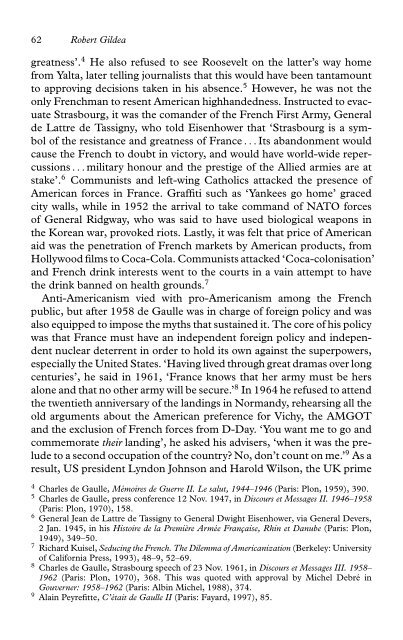Memory and Power in Post-War Europe: Studies in the Presence of ...
Memory and Power in Post-War Europe: Studies in the Presence of ...
Memory and Power in Post-War Europe: Studies in the Presence of ...
You also want an ePaper? Increase the reach of your titles
YUMPU automatically turns print PDFs into web optimized ePapers that Google loves.
62 Robert Gildea<br />
greatness’. 4 He also refused to see Roosevelt on <strong>the</strong> latter’s way home<br />
from Yalta, later tell<strong>in</strong>g journalists that this would have been tantamount<br />
to approv<strong>in</strong>g decisions taken <strong>in</strong> his absence. 5 However, he was not <strong>the</strong><br />
only Frenchman to resent American highh<strong>and</strong>edness. Instructed to evacuate<br />
Strasbourg, it was <strong>the</strong> com<strong>and</strong>er <strong>of</strong> <strong>the</strong> French First Army, General<br />
de Lattre de Tassigny, who told Eisenhower that ‘Strasbourg is a symbol<br />
<strong>of</strong> <strong>the</strong> resistance <strong>and</strong> greatness <strong>of</strong> France ...Its ab<strong>and</strong>onment would<br />
cause <strong>the</strong> French to doubt <strong>in</strong> victory, <strong>and</strong> would have world-wide repercussions<br />
...military honour <strong>and</strong> <strong>the</strong> prestige <strong>of</strong> <strong>the</strong> Allied armies are at<br />
stake’. 6 Communists <strong>and</strong> left-w<strong>in</strong>g Catholics attacked <strong>the</strong> presence <strong>of</strong><br />
American forces <strong>in</strong> France. Graffiti such as ‘Yankees go home’ graced<br />
city walls, while <strong>in</strong> 1952 <strong>the</strong> arrival to take comm<strong>and</strong> <strong>of</strong> NATO forces<br />
<strong>of</strong> General Ridgway, who was said to have used biological weapons <strong>in</strong><br />
<strong>the</strong> Korean war, provoked riots. Lastly, it was felt that price <strong>of</strong> American<br />
aid was <strong>the</strong> penetration <strong>of</strong> French markets by American products, from<br />
Hollywood films to Coca-Cola. Communists attacked ‘Coca-colonisation’<br />
<strong>and</strong> French dr<strong>in</strong>k <strong>in</strong>terests went to <strong>the</strong> courts <strong>in</strong> a va<strong>in</strong> attempt to have<br />
<strong>the</strong> dr<strong>in</strong>k banned on health grounds. 7<br />
Anti-Americanism vied with pro-Americanism among <strong>the</strong> French<br />
public, but after 1958 de Gaulle was <strong>in</strong> charge <strong>of</strong> foreign policy <strong>and</strong> was<br />
also equipped to impose <strong>the</strong> myths that susta<strong>in</strong>ed it. The core <strong>of</strong> his policy<br />
was that France must have an <strong>in</strong>dependent foreign policy <strong>and</strong> <strong>in</strong>dependent<br />
nuclear deterrent <strong>in</strong> order to hold its own aga<strong>in</strong>st <strong>the</strong> superpowers,<br />
especially <strong>the</strong> United States. ‘Hav<strong>in</strong>g lived through great dramas over long<br />
centuries’, he said <strong>in</strong> 1961, ‘France knows that her army must be hers<br />
alone <strong>and</strong> that no o<strong>the</strong>r army will be secure.’ 8 In 1964 he refused to attend<br />
<strong>the</strong> twentieth anniversary <strong>of</strong> <strong>the</strong> l<strong>and</strong><strong>in</strong>gs <strong>in</strong> Norm<strong>and</strong>y, rehears<strong>in</strong>g all <strong>the</strong><br />
old arguments about <strong>the</strong> American preference for Vichy, <strong>the</strong> AMGOT<br />
<strong>and</strong> <strong>the</strong> exclusion <strong>of</strong> French forces from D-Day. ‘You want me to go <strong>and</strong><br />
commemorate <strong>the</strong>ir l<strong>and</strong><strong>in</strong>g’, he asked his advisers, ‘when it was <strong>the</strong> prelude<br />
to a second occupation <strong>of</strong> <strong>the</strong> country?No, don’t count on me.’ 9 As a<br />
result, US president Lyndon Johnson <strong>and</strong> Harold Wilson, <strong>the</strong> UK prime<br />
4 Charles de Gaulle, Mémoires de Guerre II. Le salut, 1944–1946 (Paris: Plon, 1959), 390.<br />
5 Charles de Gaulle, press conference 12 Nov. 1947, <strong>in</strong> Discours et Messages II. 1946–1958<br />
(Paris: Plon, 1970), 158.<br />
6 General Jean de Lattre de Tassigny to General Dwight Eisenhower, via General Devers,<br />
2 Jan. 1945, <strong>in</strong> his Histoire de la Première Armée Française, Rh<strong>in</strong> et Danube (Paris: Plon,<br />
1949), 349–50.<br />
7 Richard Kuisel, Seduc<strong>in</strong>g <strong>the</strong> French. The Dilemma <strong>of</strong> Americanization (Berkeley: University<br />
<strong>of</strong> California Press, 1993), 48–9, 52–69.<br />
8 Charles de Gaulle, Strasbourg speech <strong>of</strong> 23 Nov. 1961, <strong>in</strong> Discours et Messages III. 1958–<br />
1962 (Paris: Plon, 1970), 368. This was quoted with approval by Michel Debré <strong>in</strong><br />
Gouverner: 1958–1962 (Paris: Alb<strong>in</strong> Michel, 1988), 374.<br />
9 Ala<strong>in</strong> Peyrefitte, C’était de Gaulle II (Paris: Fayard, 1997), 85.
















